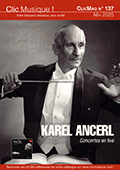|
|
|
Format : 1 CD
Total Time : 00:57:48
Recording : 12-15/08/2016
Location : Monsano
Country : Italie
Sound : Studio / Stereo
Label : Stradivarius
Catalog No. : STR37056
EAN : 8011570370563
Price Code : DM021A
Publishing Year : 2017
Release Date : 01/03/2017
Genre : Classical
|
|
 |
Gustav Holst (1874-1934)Quatre mélodies pour voix et violon, op. 35 (arr. pour baryton et alto de H. Schulz) Jesus Sweet
My soul has nought but fire and ice
I sing of a maiden
My Leman is so true Ralph Vaughan Williams (1872-1958)Along the Field We'll to the woods no more
Along the Field
The half-moon westers low
In the morning
The high that heaves the grasses
Good-bye
Fancy's knell
With rue my heart is laden Luis de Pablo (1930-2021)Solo-kunst, Trois fugues extraits de "L'Art de la fugue" de J.S. Bach (arr. pour alto de M. Barbetti) Hartmut Schulz (1964-)Salutatio Virtutum Ave Regina sapientia
Nullus homo es penitus
Sancta Sapientia confundit Satan Hartmut Schulz, baryton
Maurizio Barbetti, alto
|
 
 This CD, entitled ‘My soul has nought but fire and ice’ compiles three song cycles of the 20th and 21st century for solo baritone voice and viola, alongside with three solo works for the instrument. As the listener may imagine, the charm of this music lies in its total reduction to the essential needs of music making: a single voice, a single instrument to support it. There are two traditions in western music which until today have limited themselves to this thrifty cast: folk music on the one hand, religious music, especially if performed in private, on the other. This CD combines both aspects by choosing pieces that vacillate between secular and religious music. Whereas the texts of the ‘Four Songs’ by Gustav Holst are clearly sacred, the music itself takes its beauty from English traditional tunes. And on the other hand, the extensive song cycle ‘Along the Field’ by Ralph Vaughan Williams, clearly secular in its lyrics, conjures an underlying atmosphere of ecclesiastic serenity and of other-worldly melancholy. Even the ‘Salutatio Virtutum’, using a text by Saint Francis of Assisi oscillates between these spheres: after all, this Saint is known for his proximity to the people in his neighborhood and not for aloof discourse. The ‘Salutatio’ is less theological treatise but a blood filled love song, St. Francis clearly imagining the virtues as beautiful maidens in the realms of heaven. This in mind, my composition combines reduced sound patterns and expansive melodic scraps to illustrate the Saint’s vision of the beauty and serenity of the virtues. The three song cycles are separated by solo viola pieces by Luis de Pablo, paying tribute to Johann Sebastian Bach, a composer, to whom religious and secular music never were alternatives but the two sides of one coin.
 |
| . |
 |
|
|
